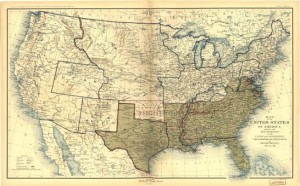 Confederate citizens are growing increasingly restless under the ever-expanding heavy hand of the Confederate government. Southern Baptist leaders are no exception.
Confederate citizens are growing increasingly restless under the ever-expanding heavy hand of the Confederate government. Southern Baptist leaders are no exception.
Basil Manly, Sr. is a leading Alabama Southern Baptist pastor and denominational leader. Today his two horses are conscripted by the Confederate Army. The man who at one time served as chaplain to the Confederate government writes of the involuntary loss of his horses in his diary, voicing ambivalence. The “impressing agent of the Government, impressed my two horses, Snip and Snap, for Government Service.” Expressing fondness for the old but reliable steeds, Manly noted that he would not “have sold them for any price that would have been offered,but for the necessity of the Government having horses.” Perhaps the need of the government to impress horses well past their prime makes the Southern Baptist minister wonder at his nation’s prospects in a war turned sour.
Meanwhile, today’s Richmond Daily Dispatch praises a guest vocalist who recently performed at the Confederate capital’s Second Baptist Church in a fund-raising benefit for southern white refugees who, driven from their homes in a search for survival, have in desperation flocked to the city seeking food and shelter. Many of these refugees are poor Baptist folk.
Among the performers at the concert for the benefit of the refugees now in this city, which was given on Tuesday night last at the Second Baptist Church Madame Ruel deserves par objections. Her merit as a vocalist could only have been surpassed by her amiability.
Neither men nor beasts are immune to the harshness of the war.
Yet amidst the gloom, all is not lost. An anonymous writer in today’s Georgia Baptist Christian Index sees “Bright Streaks in the Sky.”
1. Our soldiers are re-enlisting with great promptness, and seem to be animated with a spirit of confidence, hopefulness and patriotic zeal.
2. The people appear to be shaking off their foolish fears and girding on the armor of hope, steadfastness and determination.
3. The opening of the campaign seems thus far to be distinguished by a remarkable frustration of the schemes of our enemies.
4. Our Congress seem at last to have stood up like men to the great crisis, and adopted strong financial and army measures, which, if properly sustained by the people, cannot fail to work immense good.
And now, if, in addition to these things, we could see a universal taking hold of Jehovah’s strength by the people of God, what might we look for? The streak of hope in our sky would spread out into the undimmed light of assurance, and we might soon expect to see the total rout of our foes, the return of peace, the firm establishment of our government. Will not the redeemed of the Lord everywhere rally? As the morning beams, shall our faith and love decline? As God seems to be answering prayer, shall we become slack in prayer? Let us rejoice with trembling. If our faith lets go of Christ, he, in grief and anger, may let go of us.
Shifting winds of ambivalence, despair and hope thus characterize white Baptist life and thought as hints of spring ebb across the Confederacy and soldiers prepare to go forth again into battle.
For enslaved Baptists of the South, however, the winds blow one direction only: that of freedom, the freedom that the Bible promises for all humans, but freedom that only the armies of the United States can bring about. Christ is with the Union Army, not the Confederacy, enslaved Baptists know with utmost certainty.
Sources: James A. Fuller, Chaplain to the Confederacy: Basil Manly and Baptist Life in the Old South, Louisiana State University Press, 2000, pp. 302-303 (link); “Worthy of Praise,” Richmond Daily Dispatch, March 11, 1864 (link); M., “Bright Streaks in the Sky,” Christian Index, March 11, 1864


